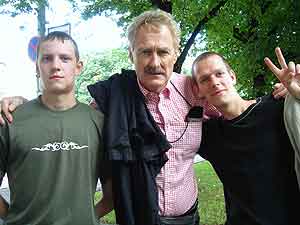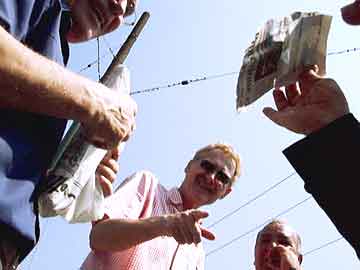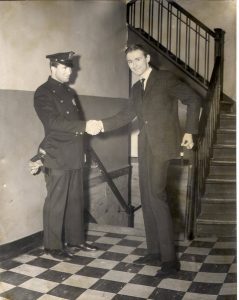
A Thief on Thieves
Conning Criminals into Conversation
Las Vegas — Who said it takes a thief to know a thief? The Tall Swede Journal detained a legal one to tell about his criminal cohorts.
Tall Swede Journal: When you’re not on stage, you find, follow, and film street thieves in action. That’s not a common pursuit, is it?
Bob Arno: I don’t think so. My wife and I might be the only ones who take it to such a sophisticated level.
TSJ: You seek out dangerous criminals with your wife?
BA: They’re usually not dangerous. But we can never be certain.
TSJ: Why might they be dangerous?

BA: Many have drug habits, so they’re unpredictable, and so is their level of desperation. Others have such long arrest records, they may do anything in an attempt to avoid jail. And others may be illegally in the country. Desperate, hunted people who are already on the wrong side of the law may feel they have little to lose.
TSJ: Bob, were you ever on the other side? You must have been.
BA: You won’t find a police record on me!
TSJ: I know, we’ve checked. How, then, do you find these thieves? How do you recognize what they are?
BA: We hang out in the environments that are suitable for this sort of occupation and we focus on behavior. A person intending to steal exhibits certain necessary “tells.” He must look at his target, watch for police, beware of curious bystanders, and surreptitiously maneuver his target into a viable position. He usually also carries a “tool,” something to cover his moves, but it’s almost always an ordinary object which alone wouldn’t cause suspicion.
“I claim [to the thief] to be in the same
profession, but I don’t elaborate. I don’t
tell them that I only steal on stage.”
TSJ: Would it be fair to say that you profile?
BA: It would be fair to say that we profile behavior.
TSJ: You mean that a thief doesn’t behave like a citizen or tourist?
BA: He certainly wishes to, but a trained observer can see through his charade.
TSJ: Any other way you find thieves?
BA: Yes. By allowing them to steal my own wallet. I stuff it with cut paper and shove it deep into my pocket. I have a wallet that’s been stolen over a hundred times.
TSJ: How do you get it back?
BA: Sometimes I steal it back! Or I steal something else from the thief, like his cell phone or sunglasses. Then I offer to trade his item for my wallet. All of this is simply to start a conversation and establish rapport.
TSJ: Then they open up to you? Why don’t they just run?

BA: They’re curious about who I am. I claim to be in the same profession they are in, but I don’t elaborate. I don’t tell them that I steal on stage, and they don’t understand the concept of returning stolen items. So, yes. About half of them are willing to talk and the other half prefer to disappear into the crowd.
TSJ: What do they reveal? What do you learn from them?
BA: Techniques, motivations, their lifestyles, the politics that allow them—or force them, from their perspective—to steal for a living.
TSJ: And what do you do with the data you gather?
BA: I train law enforcement and security agencies, I teach travelers how to avoid becoming victims, I’ve written a book, and I testify as an expert witness.
TSJ: Seems to be a useful pursuit, if an unusual one.
BA: Yes. And it also satisfies the original intent, which was to adapt street techniques for use in my stage show. But it turns out that the intelligence is appreciated by more than just my audience.
TSJ: Are you still actively researching street crime?
BA: Absolutely! We focused on Central America recently. We spent significant time in Panama interviewing a very dangerous gang [article coming shortly], and we are planning to revisit the Middle East later this year.
TSJ: I have to ask you once more: have you ever stolen for real?
BA: I have a very fine soap collection.
TSJ: Alright Bob, I’ll leave it at that. Thanks very much for speaking with The Tall Swede Journal.
This interview was originally published in The Tall Swede Journal.







1 Comment
soap? A collector’s dream on Ebay